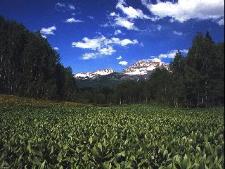
Please read the pages indicated by Z-21 and study Behavioral Objective #33. South of the tundra in both North America and Eurasia is found a zone dominated by coniferous forest. This is the taiga.
Locate the position on earth where this biome is located by studying the map showing the biomes of the world.
Like the
tundra, the taiga is dotted by countless lakes, ponds, and bogs. And like
the tundra, it has a very cold winter, but it has a longer and somewhat
warmer summer. During the summer the subsoil can thaw and vegetation can
grow more abundantly than in the tundra. The number of different species
living on the taiga is larger than on the tundra, but it is considerably
smaller than biomes farther south. The taiga is a forest of
evergreen scaly or needle leaved trees. Thier may be considerble
preciptation in the form of snow, but this water is not avaiable to
plants until spring thaw; coniferous forest are actually very dry
environments. Pine needles are adapted for plants to survive in very
dry areas (xerophtic). Though conifers are the most
characteristic of the larger plants on the taiga, some deciduous
trees (trees that drop their leaves each season), are also common. Among
the animals that one might find in the taiga are moose, black bears,
wolves, minks, wolverines, martens, squirrels, and many smaller rodents
that are all important mammals in the taiga communities. Birds, during the
summer, are very abundant as well.
The soils are thin (little topsoil) and acidic. These
soils form slowly due to low temperatures and waxy covering of the
needles which decomposes slowly.
Activity: Write a paragraph describing which environmental factors are responsible for the characteristic adaptations demonstrated by the plants and animals in the taiga biome and give examples of the flora and fauna which may be found in this ecosystem’s trophic levels.
Like the tundra, the northern taiga forest community is also circumpolar, dominated by __________ trees.
- a. deciduous
- b. annual
- c. pine (coniferous)
- d. epiphytic
- e. oak
Created by the Multimedia Development Lab, Academic Technology Services.
Last modified November 19, 1997.